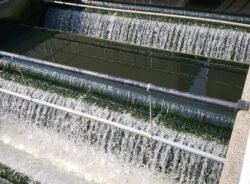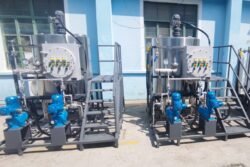
Portable Water Softener For RV
Portable Water Softener for RV: A Comprehensive Guide
Traveling in an RV can be one of the most liberating experiences, offering the flexibility to explore new locations with all the comforts of home. However, one common problem that RV owners often encounter is hard water. Hard water—which contains high levels of minerals like calcium and magnesium—can negatively affect your RV’s plumbing system and appliances, leading to a range of issues. This is where a portable water softener comes into play. In this article, we will dive deep into what portable water softeners are, how they work, their benefits, and how to choose the right one for your RV.
Understanding Hard Water
Before we explore the benefits of portable water softeners, it’s essential to understand what hard water is and why it can be problematic for RV owners.
What is Hard Water?
Hard water is water that contains high concentrations of dissolved minerals, primarily calcium and magnesium. The level of hardness is measured in grains per gallon (gpg), with water being classified as soft if it has less than 1 gpg of hardness. As water sources vary, some regions have naturally hard water while others do not.
Why is Hard Water a Problem?
-
Scale Build-up: One of the most common problems caused by hard water is the build-up of scale in pipes, faucets, and appliance parts such as water heaters. This can lead to decreased efficiency and even breakdowns.
-
Inefficiency of Soaps and Detergents: Hard water reacts negatively with soaps and detergents, making it difficult to create a lather. This can lead to overuse of these products, increasing costs and environmental impact.
-
Spotting and Staining: Hard water can leave unsightly spots and stains on dishes, glassware, and fixtures, which can be frustrating for RV owners who value cleanliness.
- Skin and Hair Issues: Hard water can also affect your skin and hair, leaving skin feeling dry and hair looking dull.
The Solution: Water Softeners
A water softener is a device designed to remove hardness-causing minerals from the water. By replacing calcium and magnesium ions with sodium or potassium ions, a water softener effectively transforms hard water into soft water, mitigating the problems associated with hard water.
What is a Portable Water Softener?
A portable water softener is a compact and mobile version of traditional water softening systems. They are especially useful for RV owners who require softened water on the go without the bulk and permanence of a fully installed water softening system.
Key Features of Portable Water Softeners
-
Size and Portability: They come in various sizes, often designed to be lightweight and compact for easy transport.
-
Ease of Use: Most portable water softeners are designed to be user-friendly, often just needing water inlet and outlet connections.
-
Regeneration Process: Portable softeners typically need to be regenerated after a set amount of water has passed through them. Many models include a simple salt-based regeneration process.
- Capacity: Different models come with varying capacities, which can determine how much treated water you can use before needing to regenerate the system.
Types of Water Softeners
When it comes to portable water softeners, there are generally two main types:
1. Salt-Based Systems
Salt-based water softeners are the most common types used in both residential and portable applications. They utilize a process called ion exchange, where hard water minerals are exchanged for sodium ions.
Pros
- Effectiveness: Extremely effective at removing hard minerals and reducing water hardness.
- Proven Technology: Salt-based systems have been around for a long time and are a reliable choice.
Cons
- Sodium Increase: Some may want to avoid the increased sodium levels in softened water, which can be a concern for people on low-sodium diets.
2. Salt-Free Systems
Salt-free systems, also known as water conditioners, do not use salt but work similarly to reduce hardness. They can prevent scale build-up and soften the water through a different mechanism, often referred to as template-assisted crystallization (TAC).
Pros
- No Salt: Good for those wishing to avoid sodium in their water.
- Less Maintenance: Often require less maintenance than salt-based systems.
Cons
- Less Effective: May not be as effective in removing hardness compared to traditional salt-based systems.
Benefits of Using a Portable Water Softener for Your RV
Installing a portable water softener in your RV comes with a range of benefits:
1. Prolongs Appliance Life
By preventing scale build-up in pipes and appliances, a portable water softener can significantly extend the lifespan of your RV’s water heater, dishwasher, and other plumbing fixtures.
2. Improves Water Quality
Softened water not only tastes better, but it also cleans better—leading to less soap scum build-up, fewer water spots on dishes and glassware, and an overall better washing experience.
3. Easy to Install and Remove
Portable water softeners are generally easy to set up and disassemble, making them ideal for RV users who may frequently relocate.
4. Cost-Effective
While the initial investment may seem steep, the savings – from reduced soap and detergent usage to longer-lasting appliances – make portable water softeners an economically sensible choice in the long run.
5. Enhances Comfort
Softened water is gentler on the skin and hair. It can improve the overall comfort of bathing and washing, adding to the RV lifestyle experience.
6. Great for Temporary Situations
Whether you are camping, at a site with hard water, or have limited access to water treatment options, a portable water softener offers a flexible solution.
How to Choose the Right Portable Water Softener for Your RV
Choosing the right portable water softener can depend on a variety of factors. Here are some key considerations:
1. Capacity
Assess how much water you typically use in your RV. Portable water softeners have different capacities, usually measured in gallons or liters. Make sure to choose one that aligns with your water usage patterns to minimize the need for frequent regeneration.
2. Regeneration Process
Check how the regeneration process works. Most portable water softeners require salt for regeneration, so consider how easy it will be for you to manage this. Some systems might use potassium chloride instead of sodium, which may be more acceptable for certain dietary needs.
3. Size and Weight
Since mobility is key in RV living, consider the size and weight of the portable water softener. It should not occupy too much storage space and should be lightweight enough to transport easily.
4. Ease of Installation
Look for models with straightforward installation processes, minimal tools needed, and clear instructions. Many systems can be installed within minutes, which is ideal for RV owners who are always on the move.
5. Price
Portable water softeners come in a range of prices. While it’s prudent to find a unit that fits within your budget, don’t sacrifice quality for cost. Look for reputable brands known for their effectiveness and durability.
6. Maintenance Requirements
Research the maintenance requirements of various units. Some models may require more frequent cleaning and maintenance than others. The easier it is to maintain, the better it is for your RV lifestyle.
Recommended Portable Water Softeners for RV
Here’s a brief overview of some popular portable water softeners tailored for RV users.
1. Watts Premier 56000 Water Softener
- Capacity: 16,000 grains
- Regeneration: Salt-based
- Pros: Compact, efficient, and user-friendly.
- Cons: Requires a supply of salt for regeneration.
2. Camco 40043 Portable Water Softener
- Capacity: 20,000 grains
- Regeneration: Salt-based
- Pros: Easy to connect, portable, and effective for RV use.
- Cons: You need to monitor and manage the salt levels.
3. On The Go OTG4-Std Softener
- Capacity: 8,000 grains
- Regeneration: Salt-based
- Pros: Lightweight, compact, and provides soft water quickly.
- Cons: Smaller capacity may not be suitable for extended use.
4. AquaPerl Water Softener
- Capacity: 16,000 grains
- Regeneration: Salt-based
- Pros: High-performance efficiency, designed for RV use.
- Cons: May require more frequent regenerations for larger families.
5. EcoPure Portable Water Softener System
- Capacity: 16,000 grains
- Regeneration: Salt-based
- Pros: Cost-effective, easy to use, and good warranty.
- Cons: Might not be as portable as other smaller models.
Installation and Maintenance Tips
-
Installation: Follow the manufacturer’s instructions carefully. Generally, you’ll need to connect the softener to the RV’s water supply, and then connect the output to your plumbing.
-
Regeneration: Monitor your softener and regenerate it regularly according to the usage and the model’s specifications. Have spare salt or potassium chloride on hand.
-
Cleaning: Keep the water softener clean and free of debris. Regularly check hoses and connections for leaks.
-
Storage: When not in use, ensure the water softener is stored in a cool, dry place, preferably indoors, away from freezing temperatures.
- Test Water Quality: Regularly test your water’s hardness to determine when you need to regenerate the softener. This can help you manage your water usage effectively.
Conclusion
In summary, a portable water softener is an indispensable investment for any RV owner dealing with hard water. From prolonging the lifespan of appliances to improving the overall experience of using water in your RV, the benefits are numerous.
When choosing the right portable water softener, consider factors such as capacity, ease of maintenance, and your water consumption habits. The right unit will help make your RV experience more enjoyable, ensuring you’re able to travel and enjoy the great outdoors, all while using clean and soft water.
So, whether you’re embarking on a short weekend getaway or a long-term RV adventure, ensure you have a portable water softener on board for a smoother, more enjoyable journey!

